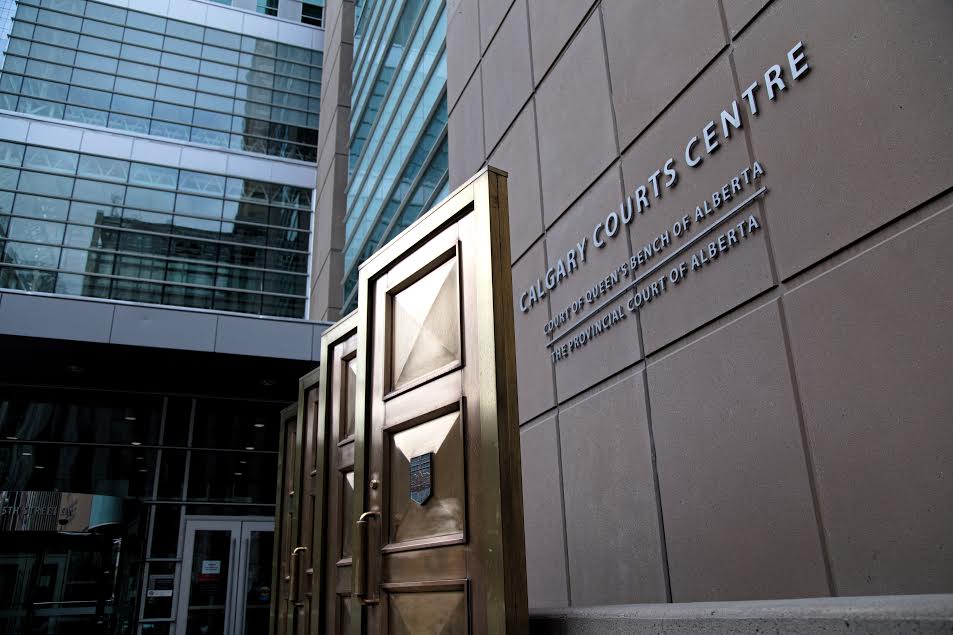
SU retains operation of MacHall until hearing reconvenes June 3
By Melanie Woods and Scott Strasser, May 10 2016 —
Debate as to who owns and operates MacHall will not end any time soon, but the University of Calgary Students’ Union will continue to operate the building in the short-term.
An injunction request filed by the SU to prevent university administration from seizing control of the building failed to reach a conclusion after three hours before the Court of Queen’s Bench on May 5.
The hearing will reconvene June 3 at 2:00 p.m. Until then, the SU will continue to operate MacHall under the terms of the 1999 License of Occupation, Operation and Management Agreement (LOOMA) and collect rent from third-party tenants.
More than 80 people, most of them students, attended the standing-room only hearing at the Calgary Courts Centre.
Members of student associations across the province were also in attendance. The Students’ Association of MacEwan University in Edmonton hopes to break ground on their own student centre in spring 2017.
“We’re in the midst of building our own building right now and this is something that weighs heavily on our minds,” SAMAC president Danika McConnell said.
The hearing comes after years of confrontation between the U of C and SU over the building’s ownership.
Both sides have exchanged hostilities since years of failed closed-door negotiations were made public in September 2015. The SU issued a statement of claim in October, suing the U of C for 55 per cent majority ownership of MacHall. The university filed their statement of defence on Nov. 10.
Throughout the hearing, the SU’s lawyers cited millions of dollars of student investment as justification for their 55 per cent ownership claims. The SU argued that letters and other documentation from MacHall’s early history state them as majority co-owners of the building.
The 1981 operating agreement marks the beginning of what the SU’s lawyers called a “watering down” of language that suggested the SU were majority owners. They said the language used in documentation changes from “owners” to “occupiers” of MacHall with no justification.
In their response, the university’s lawyers called the original 1969 agreement — which cites the SU as co-owners — “a misnomer.” They argued that as owners of the land the university was situated on, the university was privy to fixtures that were on that land.
The university’s lawyers disputed the notion of SU ownership, stating there was “never any grant or transfer of any ethereal interests” or subdivision of the land.
The SU’s legal team accused the university’s lawyers of “picking and choosing” which documents supported their case.
The university argued that the 35 years of “free rent” and revenue collected from their operating agreements since 1981 were more than enough compensation for the union’s initial investments into the building.
The SU disagrees.
“For that to be justified compensation, a decision would’ve been written down at some point,” SU president Stephan Guscott said.
University administration initially stated they planned to assume control of MacHall after the original 1999 agreement expired on Dec. 9. However, both sides agreed to enter closed-door mediation on Dec. 3, extending the LOOMA for the duration of mediation. The mediation period ended after talks broke down April 15.
Guscott said the SU sent an “olive branch” proposed agreement to the university on May 2 as a last minute effort at a truce.
“I was trying to see if there was any way we could return to a deal we discussed in mediation,” Guscott said. “Unfortunately, the university was unwilling to engage in a discussion.”
U of C senior director of strategic communications Scott Donaldson said before the hearing that if the university assumes management of MacHall, the building will remain fully open and operational. He said the SU would continue to run all businesses they currently operate in MacHall and collect the revenues.
“The university is committed to working with the SU to continue to support student programs and services in MacHall through the utilization of net proceeds received from third-party tenants,” said Donaldson in a statement.
Outgoing SU vice-president operations and finance Sarah Pousette said in late February that the SU had already spent $150,000–$175,000 in legal fees on the dispute. In March, the SU approved the creation of a $500,000 “MacHall defence fund” to continue funding the dispute.
Guscott said the only winners in a lengthy legal battle “would be the lawyers.”
“Both sides have acknowledged that going to court is not good,” Guscott said. “It’s not good for the university and it’ll damage the reputation of the university. But I’m not willing to give up the rights that students have paid for, that alumni have paid for.”
With the LOOMA extended, the SU will continue to collect revenue from third-party tenants until the reconvened hearing on June 3.
The university declined to comment on the hearing until a verdict is reached.
